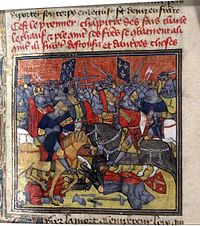Battle of Fontenoy (841)
This article needs additional citations for verification. (December 2008) |
| Battle of Fontenoy | |||||||
|---|---|---|---|---|---|---|---|
| Part of the Carolingian wars of succession | |||||||
 The battle as depicted in the fourteenth-century Grandes Chroniques de France. | |||||||
| |||||||
| Belligerents | |||||||
| Imperialists | Divisionists | ||||||
| Commanders and leaders | |||||||
|
Lothar I , and King Pepin II of Aquitaine |
Charles the Bald, Louis the German | ||||||
| Casualties and losses | |||||||
| Unknown | Unknown | ||||||
The three-year Carolingian Civil War culminated in the decisive Battle of Fontenoy, also called the Battle of Fontenoy-en-Puisaye,
Although the battle is known to have been large, it was not well documented. Many historical sources are believed to have been destroyed after the war, leaving scant records from which to conjecture the numbers of combatants and casualties.
Background
Louis the Pious throughout his long reign had entreated to divide his empire meritoriously amongst his sons—all his sons—as it was required by the
On 24 July 840 in
The battle
The two armies met on 25 June. According to tradition, Charles established his camp at
"Neither dew nor showers nor rain ever fell again on that field where the most battle-hardened warriors had perished mourned by their mothers, their sisters, their brothers, and their friends. On Charles' side and Louis too, the fields were white with the linen habits of the dead as they might have been with birds in the autumn."[4]
In spite of his personal gallantry, Lothair was defeated and fled to his capital of Aachen. With fresh troops he entered upon a war of plunder, but the forces of his brothers were too strong for him, and taking with him such treasure as he could collect, he abandoned to them his capital.
Angelbert's account

Verses by Angelbert, who fought the battle on the side of Lothar are cited by historian Eleanor Shipley Duckett as the "Most striking of all these Latin records of the battle".[5] The verses in English are...
Fontenoy they call its fountain, manor to the peasant known,
There the slaughter, there the ruin, of the blood of Frankish race;
Plains and forest shiver, shudder; horror wakes the silent marsh.
Neither dew nor shower nor rainfall yields its freshness to that field,
Where they fell, the strong men fighting, shrewdest in the battle's skill,
Father, mother, sister, brother, friends, the dead with tears have wept.
And this deed of crime accomplished, which I here in verse have told,
Angibert myself I witnessed, fighting with the other men,
I alone of all remaining, in the battle's foremost line.
On the side alike of Louis, on the side of Charles alike,
Lies the field in white enshrouded, in the vestments of the dead,
As it lies when birds in autumn settle white off the shore.
Woe unto that day of mourning! Never in the round of years
Be it numbered in men's annals! Be it banished from all mind,
Never gleam of sun shine on it, never dawn its dusk awake.
Night it was, a night most bitter, harder than we could endure,
When they fell, the brave men fighting, shrewdest in the battle's skill,
Father, mother, sister, brother, friends, the dead with tears have wept.
Now the wailing, the lamenting, now no longer will I tell;
Each, so far as in him lieth, let him stay his weeping now;
On their souls may He have mercy, let us pray the Lord of all.[5]
See also
- Oath of Strasbourg(842)
- Treaty of Verdun (843)
- Angelbert
- Battle of Fontenoy (1745)
References
- ^ This usage is found, for example, in the Cambridge Medieval History, edited by Henry Melvill Gwatkin and James Pounder Whitney, and in Guy Halsall (2003), Warfare and Society in the Barbarian West, 450–900 (Routledge).
- ^ Frederic Austin Ogg, A Source Book of Mediæval History, London, 1908, p. 150 "... the issue was put to the test in a great battle at Fontenay ..."
- Agnellusof Ravenna, is probably exaggerated.
- ^ Poet., p. 138; French trans. in D. Norberg, Manuel pratique de latin medieval, Paris, 1968, p. 166.
- ^ a b Eleanor Shipley Duckett (1969). Carolingian Portraits: a study in the ninth century. Ann Arbor Paperbacks.
Sources
- Initial text adapted from the entry for Lothair I in the 1911 Encyclopedia.
